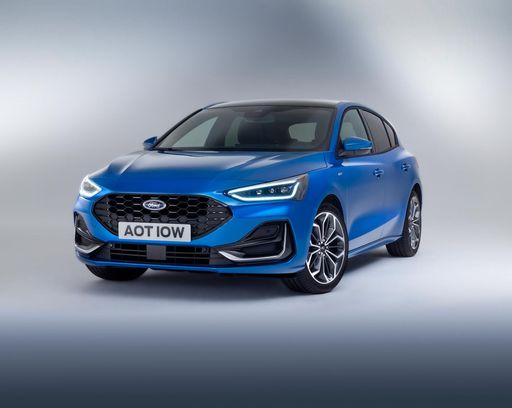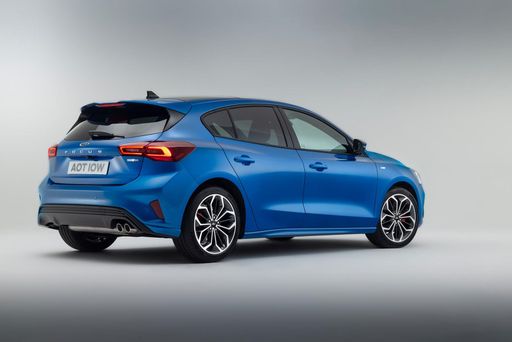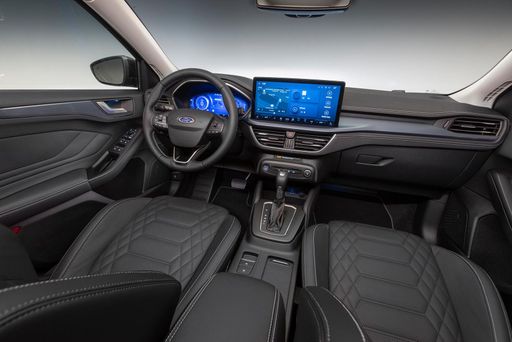Ford Focus VS Nissan Interstar – Specs, Efficiency & Price Comparison
Which model is the better choice – the Ford Focus or the Nissan Interstar? We compare performance (280 HP vs 180 HP), boot capacity (392 L vs ), efficiency (4.90 L vs 7.40 L), and of course, the price (27500 £ vs 33300 £).
Find out now which car fits your needs better!
The Ford Focus (Hatchback) is powered by a Petrol MHEV, Diesel or Petrol engine and comes with a Manuel or Automatic transmission. In comparison, the Nissan Interstar (Cargo Van) features a Diesel or Electric engine and a Manuel or Automatic gearbox.
When it comes to boot capacity, the Ford Focus offers 392 L, while the Nissan Interstar provides – depending on what matters most to you. If you’re looking for more power, you’ll need to decide whether the 280 HP of the Ford Focus or the 180 HP of the Nissan Interstar suits your needs better.
There are also differences in efficiency: 4.90 L vs 7.40 L. In terms of price, the Ford Focus starts at 27500 £, while the Nissan Interstar is available from 33300 £.
Compare all the key specs now and find out which model fits your lifestyle best!
Ford Focus
The Ford Focus is celebrated for its agile handling and stylish design, making it a popular choice among hatchback enthusiasts. Its well-crafted interior offers a comfortable driving experience with intuitive technology features. Whether navigating city streets or cruising on the motorway, the Ford Focus delivers a balanced drive with impressive efficiency.
details @ focus.fordpresskits.com
@ focus.fordpresskits.com
 @ focus.fordpresskits.com
@ focus.fordpresskits.com
 @ focus.fordpresskits.com
@ focus.fordpresskits.com
Nissan Interstar
The Nissan Interstar is a versatile van that expertly combines practicality with modern design. It offers a spacious interior that caters to both cargo and passenger needs, making it ideal for businesses and families alike. With its robust performance and efficient fuel consumption, the Interstar stands out as a reliable choice in the commercial vehicle market.
details

|
|
|
|
|
Costs and Consumption |
|
|---|---|
|
Price
27500 - 42700 £
|
Price
33300 - 55600 £
|
|
Consumption L/100km
4.9 - 8 L
|
Consumption L/100km
7.4 - 7.5 L
|
|
Consumption kWh/100km
-
|
Consumption kWh/100km
-
|
|
Electric Range
-
|
Electric Range
175 - 410 km
|
|
Battery Capacity
-
|
Battery Capacity
-
|
|
co2
117 - 183 g/km
|
co2
0 - 195 g/km
|
|
Fuel tank capacity
52 L
|
Fuel tank capacity
80 - 105 L
|
Dimensions and Body |
|
|---|---|
|
Body Type
Hatchback
|
Body Type
Cargo Van
|
|
Seats
5
|
Seats
3 - 7
|
|
Doors
5
|
Doors
4
|
|
Curb weight
1330 - 1529 kg
|
Curb weight
1927 - 2538 kg
|
|
Trunk capacity
392 L
|
Trunk capacity
-
|
|
Length
4382 - 4397 mm
|
Length
5048 - 6848 mm
|
|
Width
1825 - 1844 mm
|
Width
2070 - 2080 mm
|
|
Height
1438 - 1482 mm
|
Height
2307 - 2808 mm
|
|
Payload
495 - 560 kg
|
Payload
845 - 1451 kg
|
Engine and Performance |
|
|---|---|
|
Engine Type
Petrol MHEV, Diesel, Petrol
|
Engine Type
Diesel, Electric
|
|
Transmission
Manuel, Automatic
|
Transmission
Manuel, Automatic
|
|
Transmission Detail
Manual Gearbox, Dual-Clutch Automatic, Schaltgetriebe, Automat. Schaltgetriebe (Doppelkupplung), Automatic Gearbox, Automatikgetriebe
|
Transmission Detail
Schaltgetriebe, Manual Gearbox, Automatikgetriebe, Automated Manual
|
|
Drive Type
Front-Wheel Drive
|
Drive Type
Front-Wheel Drive, Rear-Wheel Drive
|
|
Power HP
115 - 280 HP
|
Power HP
105 - 180 HP
|
|
Acceleration 0-100km/h
5.7 - 11.8 s
|
Acceleration 0-100km/h
-
|
|
Max Speed
186 - 250 km/h
|
Max Speed
115 - 177 km/h
|
|
Torque
170 - 420 Nm
|
Torque
300 - 400 Nm
|
|
Number of Cylinders
3 - 4
|
Number of Cylinders
4
|
|
Power kW
85 - 206 kW
|
Power kW
77 - 132 kW
|
|
Engine capacity
999 - 2261 cm3
|
Engine capacity
1997 - 2299 cm3
|
General |
|
|---|---|
|
Model Year
2022 - 2024
|
Model Year
2021 - 2025
|
|
CO2 Efficiency Class
D, G
|
CO2 Efficiency Class
G, A
|
|
Brand
Ford
|
Brand
Nissan
|
Ford Focus
A Revamped Classic: The Ford Focus
The Ford Focus has long been a staple in the compact car market, offering a blend of practicality, performance, and affordability. With the latest iterations, Ford continues to build on this reputation, introducing a series of technical enhancements and innovative features aimed at both seasoned car enthusiasts and daily commuters alike.
Innovative Powertrains and Engine Performance
The latest Ford Focus models are equipped with a variety of engine options tailored to diverse driving preferences. At the heart of the lineup are the EcoBoost Hybrid engines, which combine efficiency with performance. These mild-hybrid petrol engines are designed to deliver responsive power with a promise of reduced emissions and fuel consumption.
For those who prefer diesel, the EcoBlue engine offers a smooth and quiet ride with impressive torque and fuel economy. Meanwhile, the high-performance ST variant, powered by a robust 280 PS petrol engine, caters to drivers seeking a sporty experience.
Driving Dynamics and Comfort
One of the Ford Focus's standout features is its superior driving dynamics, balanced perfectly between comfort and agility. Whether equipped with a manual, automatic, or dual-clutch PowerShift transmission, the Focus ensures a responsive drive that adapts to both urban and highway conditions.
The vehicle's suspension system has been finely tuned to absorb road imperfections, offering a composed ride that neither sacrifices comfort nor handling precision. With front-wheel drive across the range, the Focus provides a stable and reassuring road presence.
Efficiency and Sustainability
The Ford Focus impresses with its commitment to fuel efficiency. The EcoBoost Hybrid engines deliver consumption as low as 5.2 L/100km, while the diesel variant offers an even more frugal 4.9 L/100km. These figures not only promise reduced running costs but also lower CO2 emissions, aligning with current sustainability trends.
With CO2 efficiency classes ranging from D to G, the Focus demonstrates a strategic blend of performance and environmental consideration, an important factor for environmentally conscious drivers.
Modern Design and Versatility
In terms of aesthetics, the latest Ford Focus models feature a sleek, aerodynamic silhouette complemented by modern design cues. Ranging from the sporty ST-Line to the sophisticated Titanium editions, each trim offers a distinct personality while maintaining the Focus's core design philosophy.
The Focus continues to offer practical versatility with features like a spacious 392-litre boot, making it suitable for family trips and everyday errands. The interior is smartly designed, providing ample space for five passengers and affording a comfortable, ergonomic driving position.
Technological Enhancements
Technology in the Ford Focus reflects the needs of today's connected driver. The vehicle is equipped with the latest Ford SYNC infotainment system, featuring a user-friendly interface and seamless smartphone connectivity. Driver-assist features such as adaptive cruise control, lane-keeping aid, and traffic sign recognition enhance safety and convenience.
Moreover, the Focus offers various driving modes to tailor the driving experience to different conditions, thus ensuring that drivers have both flexibility and control at their fingertips.
Conclusion: An Evolved Icon
The Ford Focus remains a dominant player in its segment, thanks to its comprehensive suite of innovative features, efficient powertrains, and dynamic styling. This model continues to evolve, providing a balanced blend of performance, economy, and technology, making it a worthy choice for those seeking a reliable yet exciting compact car.
Nissan Interstar
The Evolution of the Nissan Interstar
The Nissan Interstar has long been a staple in the commercial vehicle sector, known for its robust build and practical design. The latest iterations have further cemented its status with a range of technical enhancements and innovative features aimed at aiding businesses in achieving optimal efficiency. Whether you're navigating city streets or traversing the highways, the Interstar stands out as a reliable workhorse ready to meet various transport needs.
Power and Performance
The current range of Nissan Interstar models boasts diesel engines ranging from 105 to 180 PS, offering a commendable blend of power and fuel efficiency across the board. With a fuel consumption of between 7.4 and 7.5 litres per 100 kilometres, these vehicles are designed to minimise operational costs while maximizing performance.
All models feature four-cylinder engines, with engine displacement between 1997 and 2299 cm³, capable of producing torque figures between 330 and 400 Nm. These specifications ensure that the Interstar offers superior pulling power, which is particularly useful for transporting heavy loads across different terrains.
Transmission and Drive Options
Versatility is at the heart of the Nissan Interstar, with transmission options including both manual and automatic gearboxes. Drivers can also choose between front-wheel and rear-wheel drive configurations, allowing the vehicle to suit specific logistical requirements or personal preferences.
For those seeking simplicity and ease of use in urban environments, the Interstar with its automated gearshift provides a smooth driving experience, reducing driver fatigue and increasing focus on the road ahead.
Dimensions and Load Capacities
The Nissan Interstar is available in various lengths, from 5048 mm to an extensive 6848 mm, catering to diverse commercial needs. With widths ranging from 2070 mm to 2222 mm and heights from 2307 mm to 2808 mm, the Interstar offers multiple configurations to maximise cargo space and accommodate various loads.
With a maximum payload capacity of up to 1451 kg, businesses can rest assured that the Interstar is more than capable of delivering goods efficiently without compromising on safety or comfort.
Innovation and Technological Features
While functionality remains a priority, Nissan has not skimped on technological advancements. Among the innovations included are advanced safety features, such as anti-lock braking systems (ABS), electronic stability control (ESC), and a variety of sensors to assist with parking and reversing.
In terms of driver comfort, the brand offers multiple trim levels with exceptional interior features designed to enhance driver experience during long hauls. Options such as climate control, advanced navigation systems, and modern infotainment setups are available, ensuring that both driver and passenger remain comfortable and connected, regardless of the journey length.
Coachwork and Trim Options
The Interstar line-up provides a range of trim levels and equipment lines, from the entry-level Visia to the high-spec Tekna, catering to different market demands and individual preferences. The selection allows buyers to prioritise features that best suit their operation or driving style.
For example, the N-CONNECTA variant offers an array of added extras, enhancing both connectivity and comfort for drivers who rely on the vehicle as a mobile office.
Conclusion
The Nissan Interstar represents a harmonious blend of power, efficiency, and technological innovation in the large van segment. With its vast array of options and features, the Interstar is undeniably a top choice for businesses looking to invest in a dependable and adaptable commercial vehicle. As the line-up continues to evolve, the Interstar remains poised to meet the growing challenges and demands of the modern logistic landscape.
The prices and data displayed are estimates based on German list prices and may vary by country. This information is not legally binding.
